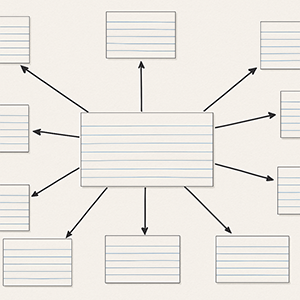Card by Card- Why Thinking Analog Still Matters

We live in a time when everything is designed to be faster, shinier, and more efficient. You can store a thousand notes in your phone. You can highlight a book and export it to Notion in seconds. You can build a second brain in the cloud.
And yet, here I am with a pen, some index cards, and a wooden box—thinking analog on purpose.
Why? Because thinking isn’t just about collecting. It’s about connecting. And analog tools slow us down just enough to let our ideas breathe.
What Digital Tools Get Wrong
Let me be clear: I’m not anti-digital. I use tech every day. But when it comes to thinking deeply, most digital tools actually work against you:
- Frictionless input makes it easy to hoard and forget
- Searchability tempts you to skip reflection
- Speed prioritizes capture over comprehension
In contrast, analog systems introduce just enough friction to encourage careful thought[1].
Writing By Hand = Thinking By Hand
When you handwrite a note, you make thousands of micro-decisions:
How should I phrase this?
Is this one idea or two?
What does this actually mean to me?
That act of slow transcription helps crystallize thoughts in a way no copy-paste ever will[2].
Analog slows you down—but in the best possible way. It’s not a bug. It’s a feature.

Card by Card = Idea by Idea
There’s something powerful about physically adding a new card to your slipbox. One card. One thought. It doesn’t feel like organizing data. It feels like making a contribution.
Each card:
- Is atomic (self-contained)
- Can stand alone or connect to others
- Becomes a building block in your broader system of thought
Over time, these cards don’t just add up—they compound.
Tangibility Builds Trust
You can see your progress. You can hold it in your hands. You don’t need Wi-Fi. The system works whether you’re at a desk, on a plane, or in a tent.
And there’s something comforting in that. Unlike digital tools that update, break, or get acquired, a slipbox just... is. It’s permanent, personal, and private[3].
Analog Thinking Isn’t Nostalgia—It’s Strategy
Using paper isn’t a rejection of modernity. It’s a conscious choice to engage with your thoughts on your terms. When the whole world is rushing, you think better by slowing down.
Analog thinking matters because:
- It gives your mind space to reflect
- It creates natural boundaries around distraction
- It keeps your ideas grounded in your own voice
Final Thoughts
You don’t need to throw out your phone or cancel your Evernote account. But if you want to do deep, meaningful thinking—the kind that creates books, insights, and lasting clarity—try picking up a pen and a pack of cards.
One card. One thought. One step forward.
Let the slipbox grow.
References
Newport, Cal. Digital Minimalism. Portfolio, 2019. ↩︎
Mueller, P. A., & Oppenheimer, D. M. (2014). "The Pen Is Mightier Than the Keyboard: Advantages of Longhand Over Laptop Note Taking". Psychological Science, 25(6), 1159–1168. ↩︎
Luhmann, Niklas. Communicating with Slip Boxes: An Empirical Account. Bielefeld University Press, 1992. ↩︎

